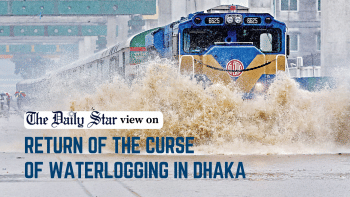Waterlogging is a gift from the city corporations

Every monsoon brings new images and stories of sufferings. After Friday's heavy rains in Dhaka, two stories that seem to have particularly stuck with many social media users involve the deaths of four individuals in electrocution and how, even 36 hours after the rain had stopped, several areas in DSCC remained submerged. For many, the first is a painful reminder of a similar tragedy in Mirpur last year. It too involved four people, including three of a family who died after being electrocuted on a waterlogged street. The second story comes with a side dish of irony, as it reminded many of a promise by the DSCC mayor about ensuring swift drainage of water—within 15 minutes no less—after heavy rains. Promises, as one quipped, die fast in Bangladesh.
But these are not just stories of sufferings but also of an abject policy failure. Unfortunately, those in charge of making sure these sufferings do not occur can apparently say or do anything and get away without facing consequences. Over the past four years, according to a report by this daily, more than Tk 730 crore has been spent by the two city corporations of Dhaka—Tk 370 crore by DNCC and Tk 360 crore by DSCC—to address the waterlogging problem. But despite the spectacular lack of effects of their initiatives, there has been no accountability whatsoever for the authorities and officials concerned.
It can be recalled that the city corporations officially took over canal and drain management from Dhaka WASA on December 31, 2020. It was meant to streamline efforts to mitigate waterlogging. It did not happen, and as a result, the situation remains as dire as before. The city's drainage system continues to be weakened by poor design, weak maintenance, and ongoing road construction/repair activities. Much of the drainage network remains clogged by waste, making it very hard for rainwater to flow into rivers. City corporation officials, speaking anonymously, also acknowledged the failure of their efforts to declutter the canals, canal-drains, and box culverts.
Currently, Dhaka has a network of 2,211 kilometres of drains, with 961km in the south and 1,250km in the north. True, ensuring the smooth function of such a big network is a big task, but there is no alternative to it, and for that improving the capacities of city corporations is crucial. But even that will not be enough. Given the unregulated growth of Dhaka, experts have stressed the importance of a master plan to restore all the canals and waterbodies, and preventing their encroachment by unscrupulous entities. Addressing improper waste disposal is also critical. But most importantly, Dhaka's persistent waterlogging problem cannot be resolved without the sincerity of relevant authorities.


 For all latest news, follow The Daily Star's Google News channel.
For all latest news, follow The Daily Star's Google News channel. 










Comments